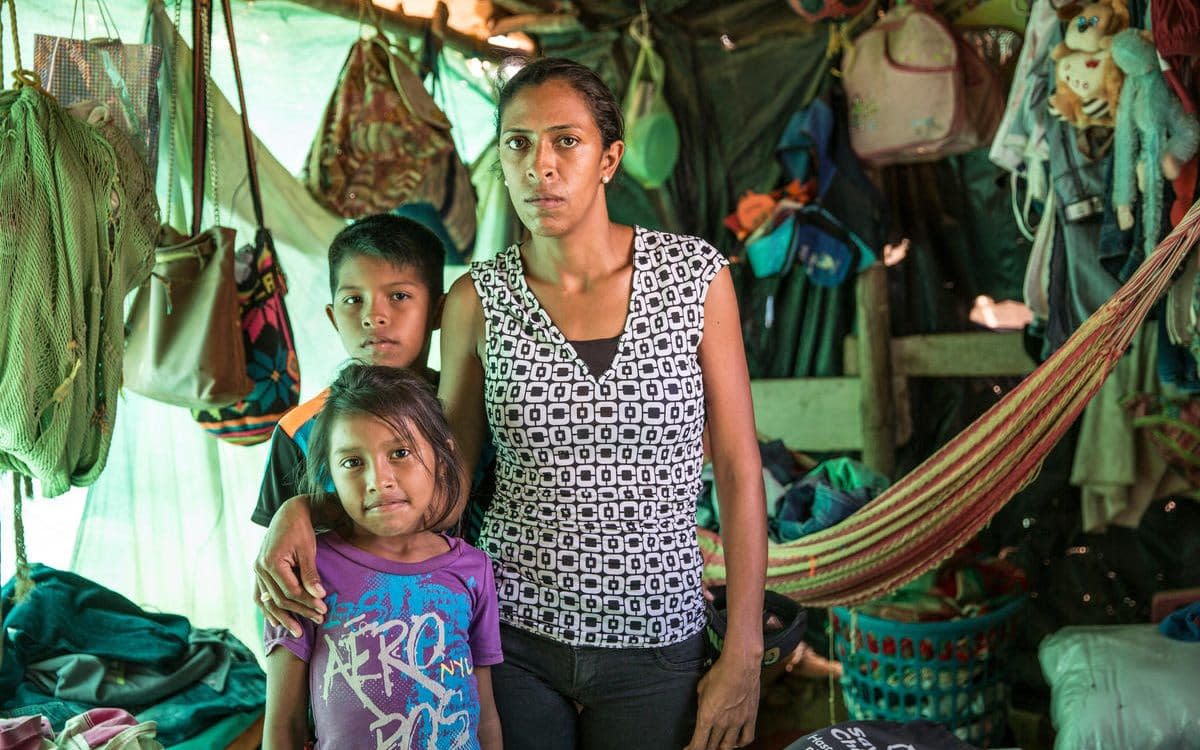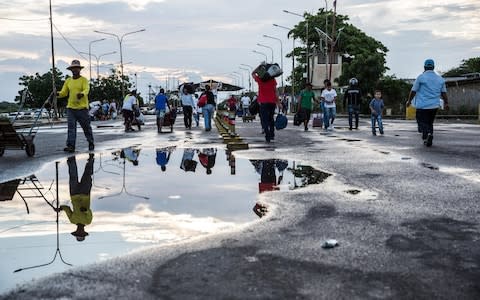Mothers and children pay the price of Venezuela's economic collapse

In the scorching heat, worried mothers clutch sick children who are presenting with a mix of maladies – fevers, convulsions, skin lesions and even acute malnutrition.
But this isn't a doctor's waiting room, it's the communal area of a migrant centre in Maicao, a dusty desert city in La Guajira, a region of northern Colombia close to the border with Venezuela.
Each day, dozens of people languish here, just a handful of the estimated three million migrants who have fled Venezuela's long-running economic and political meltdown over the last few years.
The children are here and not in a doctor's office because Venezuelan migrants often don't have the papers to sign up to a Colombian insurer or the means to get to the main hospital which is more than 40 minutes walk out of town under the blazing sun.
Sadly, with the Venezuelan health system short of medicine, supplies or trained staff, this is the next best alternative.
The starkest example of the failings of the two health systems is 38-year-old Luisa*. With 10 other children back in Venezuela, she made the hazardous cross-border journey to San Jose Hospital outside Maicao, on the Colombian side of the border to give birth.

Speaking from her bed, just hours after the birth of her son, she told the Telegraph how both she and her baby are infected with syphilis, a sexually-transmitted infection that can be treated with antibiotics.
If left untreated, it can be transmitted from mother to unborn child. Maicao has seen 31 pregnant Venezuelan women with syphilis and six babies born with the disease this year alone.
“I came here because I was pregnant and there was nothing in the hospitals in Venezuela, nothing,” she said.
The hospital's deputy director, Mabis Mercado Rua, says that failure to treat syphilis in a pregnant woman is a visible sign of how very few Venezuelans are receiving basic medical care.
Three years ago Venezuela stopped all its vaccination programmes and this, combined with malnutrition, means incidence of preventable diseases is increasing.
“Malnutrition is the mother of all other diseases,” says Ms Mercado Rua. “When children and mothers only have one or two meals a day, they are vulnerable to all other kinds of health problems.”

Ms Mercado Rua says the health district spent £1.7 million caring for Venezuelans alone in the last 12 months.
Each health district receives funding based on its population, with an emergency fund to cover any unexpected spike in patient numbers. In 2016 the hospital treated just 632 Venezuelan patients but in the first nine months of 2018 alone the hospital has seen 5190.
The hospital is not allowed to turn away emergency patients and is now facing its own financial problems as the fund does not cover all the extra patients.
“We were already in an economic crisis and now we are behind on staff payments and suppliers' bills because the government hasn’t allocated the resources we need,” says Ms Mercado Rua.
According to a September 2018 report from Codevida, a coalition of health NGOs based in Venezuela, in 2016 the Venezuelan government stopped paying for medicines for people with cancer, HIV and chronic diseases like multiple sclerosis, lupus and pulmonary hypertension.
The report found that 22 hospitals across Venezuela have shut their accident and emergency departments and a further 71 operate on an intermittent basis only.
This is on top of the 79 clinics that lack basic medical supplies. Worse still, estimates from the Venezuelan Medical Federation indicate that nearly 22,000 doctors fled the country between 2002 and 2017.
Leonardo Perez is one such doctor. A gynaecologist by training, he now works as a GP at the San Jose hospital in Maicao while he waits for his specialist accreditation to navigate Colombian bureaucracy.
Many Venezuelans are disappointed and angry when they arrive in Colombia because they feel their country provided free and high quality healthcare to Colombian migrants in the not-too-distant past.
Dr Perez said: "Ten years ago, we had the same level of health care in Venezuela, we could provide quality health care to everyone, including Colombians.
"[Venezuelans] are expecting the same level of care, for free, they used to receive in Venezuela, so they get upset when they get here and that's not the case."
In the dusty lanes of the Villa del Sur, at a sports facility turned migrant camp outside Riohacha, the capital of La Guajira, the desperate state of affairs is highlighted by Adrianna*, Javier* and their new baby Carolina*, who is just three months old.

The couple walked for nearly three weeks while Adrianna was eight months pregnant so she could escape the chaos of Venezuela's health system and give birth in Colombia.
She’s not alone. Hundreds of pregnant women or those who have recently given birth join her in the hospitals and clinics of La Guajira.
“The next night after giving birth, we were back living on the streets of Maicao," she said. “I slept only during the day because I was afraid someone would take my baby in the night.”
In the same camp, Maria* is keeping two of her children, Jorge*, 12 and Evalene*, eight, out of school for weeks because they both have hepatitis A and she cannot afford to treat them.
Elena Tiffert-Vaughan, humanitarian crisis response team leader in Colombia for UK children’s charity Save the Children, says she has found pregnant women living on the streets.

Ms Tiffert-Vaughan adds: "More and more women are now crossing the border. There is absolutely nothing for them in Venezuela, the situation is dire."
Other foreign aid organisations are already on the ground, from the International Organization for Migration to the Red Cross. At the old hospital campus, medical NGO Americares is providing basic medical care, including the provision of medicines.
In the meantime, back at the migrant centre, the children make paper butterflies in the Save the Children safe space tent and are sheltered from harsher realities of their situation. For their parents, the hunt for work to pay for the medicine they need goes on.
*Names changed for safety reasons.

Protect yourself and your family by learning more about Global Health Security

 Yahoo News
Yahoo News 
